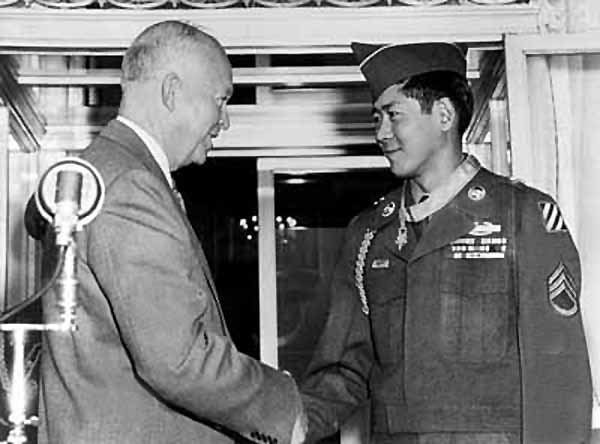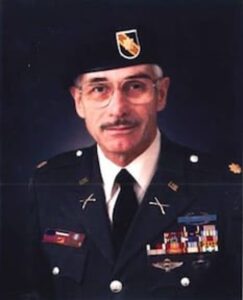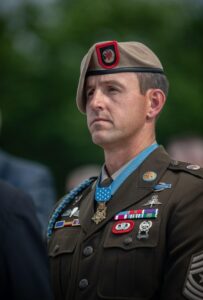Recipient: Hiroshi (Hershey) Miyamura
Branch: U.S. Army
Combat: Korean War
In the annals of history, there are names that stand out as beacons of courage, resilience, and sacrifice. One such name is Hiroshi Miyamura, a man whose story is not just one of valor on the battlefield, but also a testament to the common humanity that binds us all together.
Early Years: From the Threat of Interment to Eager Enlistment
Born to Japanese immigrants in Gallup, New Mexico on October 6, 1925, Hiroshi “Hershey” Miyamura came of age during World War II amid a presidential order to relocate and incarcerate Japanese Americans due to fears that these citizens would betray the United States. Thankfully, this order was only mandatory for communities near the coast. The leaders of Gallup chose to ignore it and allow their Japanese-American residents to live their lives without intervention or interruption.
Like many of his Japanese-American peers, Miyamura was eager for an opportunity to prove his loyalty to the United States, the only home he’d ever known. He enlisted in 1945, joining the Army’s all-Nisei 442nd Infantry Regiment, composed exclusively of second-generation Japanese Americans. His unit was on a ship off the shores of Naples, waiting to disembark when they were told the war had ended. Miyamura would have to wait for his chance to serve.
In 1950, China declared war on Korea, and he was called to active duty—and one of the most harrowing experiences of his life.
Outnumbered, outgunned, and out of bullets.
It was April 24, 1951. Cpl. Miyamura and Company H were occupying a defensive position near Taejon-ni, Korea when they came under ferocious fire from the Chinese.
Sensing looming danger to his comrades, Cpl. Miyamura, a machine-gun squad leader, left his shelter and charged the enemy with a bayonet, killing at least 10 before returning to his post to provide medical aid to wounded soldiers.
As another barrage of bullets rained on his men, Cpl. Miyamura leaped to his machine gun and yielded return fire until he ran out of ammunition. He ordered his men to withdraw while he stayed behind to disable the gun, ensuring one less weapon in the enemy’s hands.
Bayonetting his way through enemy soldiers, he reached a second machine gun post and began firing as he ordered his men to fall back. He continued to cover their movements, killing more than 50 of the enemy before he depleted his ammunition and became critically injured.
As Company H exited to safety, Cpl. Miyamura’s men last saw him fighting ferociously against an overwhelming onslaught of enemy combatants.
28 Months of Paralyzing Uncertainty
Captured by the Chinese, Cpl. Miyamura awoke the next day as a prisoner of war (POW).
For two years, he lived in a prison camp, his name held secret by the Chinese.
For two years, he deeply feared that he had failed his men and would face charges for losing so many men during that final battle.
The U.S. Government marked him as “Missing in Action.”
Unbeknownst to Cpl. Miyamura, some of the men in Company H shared their experiences with U.S. authorities. Based on their testimonies, Miyamura was awarded the Medal of Honor eight months after the battle, an honor that remained secret out of fear his captors would kill him if they found out how many men he had killed before his capture.
The Release—and the Relief
On August 23, 1953, Cpl. Miyamura and 19 other POWs were released almost a month after the end of the Korean War.
When he met the U.S. commanding general of the 3rd Infantry Division at Freedom Village in Panmunjom, South Korea, he mentally prepared to be court-martialed for losing his men.
Instead, he was told that President Harry S. Truman had bestowed the Medal of Honor.
Cpl. Miyamura humbly responded, “I didn’t want to see my men killed, and I just covered the withdrawal. I didn’t think I was doing anything heroic. I just thought I was doing my job.”
[IMAGE OF THE CERTIFICATE AS AN ARTIFACT]
An Exemplary Citizen
After his release, Cpl. Miyamura returned to Gallup, New Mexico, where he ran a gas station and repair shop named Humble Oil. Receiving the Medal of Honor inspired him to set an example for the younger generations.
“I’ve always been a person who never said too much,” Miyamura once said. “I was more or less a loner, I guess you’d say. But it made me aware that I was wearing our nation’s highest honor and I had to act differently, especially among the younger people.”
In 2014, the FBI’s Albuquerque division granted him the Director’s Community Leadership Award for his passionate work and community service. As one of only 65 living Recipients at the time, Cpl Miyamura often spoke publicly about the medal and was present at the groundbreaking of the National Medal of Honor Museum in Arlington, Texas.
Cpl Hiroshima “Hershey” Miyamira passed away on November 29, 2022, and was buried with full military honors at Sunset Memorial Park in Gallup. His life, story, and Medal will be featured prominently at the National Medal of Honor Museum when it opens on March 25, 2025.




